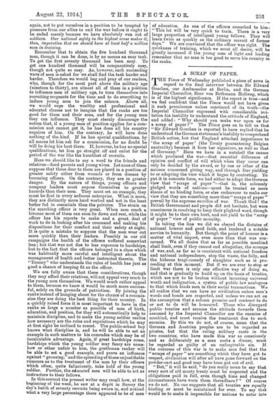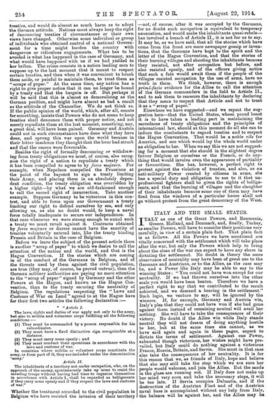A SCRAP OF PAPER. T HE Times of Wednesday published a
piece of news in regard to the final interview between Sir Edward Goschen, our Ambassador at Berlin, and the German Imperial Chancellor, Herr von Bethmann Hollweg, which is of the highest significance. If the report is true—and we feel confident that the Times would not have given it such prominence unless convinced of its truth—the Imperial Chancellor expressed with considerable irri- tation his inability to understand the attitude of England, and added : " Why should you make war upon us for a scrap of paper ? " The Times goes on to tell us that " Sir Edward Goschen is reported to have replied that he understood the German statesman's inability to comprehend British action, but that England attached importance to the scrap of paper' (the Treaty guaranteeing Belgian neutrality) because it bore her signature, as well as that of Germany." Here we have in a nutshell the causes which produced the war—that essential difference of opinion and conflict of will which when they occur can only be decided by the sword, or by one or other of the nations concerned giving way, and through fear yielding to or adopting the view which it began by contesting. To put it in concrete form, we had either to adopt the German view that "scraps of paper "—that is, the solemnly pledged words of nations—must be treated as mere shams of no binding force, or else endeavour to make our view that they are something more than" scraps of paper" prevail by the supreme sacrifice of war. Thank God ! the British Government and people did not hesitate, but were unanimous in resolving to keep their plighted word, though it might be to their own hurt, and not yield to the " scrap of paper " view of public morality.
In taking the line we did we obeyed the dictates of national honour and good faith, and rendered a notable service to humanity. But though the point of honour is a matter of vital import, even more than that was con- cerned. We all desire that as far as possible mankind shall limit, even if they cannot end altogether, the scourge of war, and, as far as is consistent with national freedom and national independence, stop the waste, the folly, and the hideous tragi-comedy of slaughter such as is pro- ceeding at this moment. But if we are ever to stop or limit war there is only one effective way of doing so, and that is gradually to build up on the basis of treaties, which are not to be broken without incurring universal wrath and indignation, a system of public law analogous to that which binds men in their social transactions. We all realize that we can have no civilization unless men's words and bonds are respected, and unless we can act on the assumption that a solemn promise and contract to do or not to do will be honoured. Those who disregard public treaties and assume the attitude towards them assumed by the Imperial Chancellor are the enemies of mankind, and must receive the treatment due to such enemies. By this we do not, of course, mean that the German and Austrian peoples are to be regarded as pirates, but that the ruling military caste in the two countries, who have made this war as consciously and as deliberately as a man cooks a dinner, must be regarded as guilty of an unforgivable sin. If the outcome of this war is to make men feel that the " scraps of paper " are something which they have got to respect, civilization will after all have gone forward on the powder-cart and good may have been got out of evil. " But," it will be said, "do you really mean to say that every sort of old musty treaty must be respected and the obligations paid in full, even though time and changed circumstances have worn them threadbare ? " Of course we do not. No one suggests that all treaties are equally binding or must be maintained for ever. To say that would be to make it impossible for nations to enter into treaties, and would do almost as much harm as to adopt the Gorman attitude. Nations must always keep the right of denouncing treaties if circumstances or their own views have changed. Otherwise some individual or group of individuals who obtained control of a national Govern- ment for a time might burden the country with dangerous or ridiculous engagements. What has to be avoided is what has happened in the case of Germany, and what would have happened with us if we had yielded to her bribes. The crime consists in a nation leading men to suppose up to the last moment that it meant to respect certain treaties, and then when it was convenient to brush them aside, or painful to maintain them, to treat them as "scraps of paper." At the same time, any nation has a right to give proper notice that it can no longer be bound by a treaty and that the bargain is off. But perhaps it will be said that this is almost as demoralizing as the German position, and might have almost as bad a result as the attitude of the Chancellor. We do not think so. If the public opinion of the world, which, after all, counts for something, insists that Powers who do not mean to keep treaties shall denounce them with proper notice, and not merely repudiate them at the last moment, something, nay, a great deal, will have been gained. Germany and Austria could not in such circumstances have done what they have done, and sprung this war upon the world because in their bitter insolence they thought that the hour had struck and that the omens were favourable.
Besides the right of formally denouncing or withdraw- ing from treaty obligations we must, of course, also recog- nize the right of a nation to repudiate a treaty which it has been compelled to agree to by force majeure. For example, when Napoleon compelled the Prussians at the point of the bayonet to sign a treaty limiting their Army, and placing them in an absolutely depen- dent condition, the treaty obligation was overridden by a higher right—by what we are old-fashioned enough to call the sacred right of insurrection. Take another example. Suppose Germany to be victorious in this con- test, and able to force upon our Government a treaty limiting our right to defend ourselves by sea, and only allowing us, as she no doubt would, to keep a naval force totally inadequate to secure our independence. In that case whenever we were strong enough to annul such a treaty we must revolt against it. Contracts obtained by force majeure or duress cannot have the sanctity of treaties voluntarily entered into, like the treaty binding Prussia and Britain in the case of Belgium.
Before we leave the subject of the present article there is another " scrap of paper" to which we desire to call the attention of the nation and the world, and that is the Hague Convention. If the stories which are coming in of the conduct of the Germans in Belgium, and of the threats used by them against the civil population, are true (they may, of course, be proved untrue), then the German military authorities are paying no more attention to the " scrap of paper " signed by Germany and the other Powers at the Hague, and known as the Hague Con- vention, than to the treaty securing the neutrality of Belgium. The regulations respecting the " Laws and Customs of War on Land " agreed to at the Hague have for their first two articles the following declaration :— "Article I.
The laws, rights and duties of war apply not only to the army, but also to militia and volunteer corps fulfilling all the following conditions :—
(1) They must be commanded by a person responsible for his subordinates.
(2) They must have a fixed distinctive sign recognizable at a distance.
(3) They must carry arms openly ; and
(4) They must conduct their operations in accordance with the laws and customs of war.
In countries -where militia or volunteer corps constitute the army, or form part of it, they are included under the denomination 'army.'
Article II.
The inhabitants of a territory not under occupation, who, on the approach of the enemy, spontaneously take up arms to resist the invading troops without having had time to organize themselves in accordance with Article L, shall be regarded as belligerents if they carry arms openly and if they respect the laws and customs of war."
Whether the treatment accorded to the civil population in Belgium who have resisted the invasion of their territory —not, of course, after it was occupied by the Germans, for no doubt such occupation is equivalent to temporary annexation, and would make the inhabitants quasi-rebels- has involved a breach of Article II., it is not for us to say. It may be, as we have said, that all the stories which have come from the front are mere newspaper gossip or inven- tions, that the Germans have kept to the spirit and the letter of the Hague Convention, and that the stories of their burning villages and shooting the inhabitants because they resisted, not after occupation but before, and also resisted openly, and of the officers giving notice that such a fate would await them if the people of the villages resisted occupation by the use of arms, have no truth in them. We think, however, there is enough primci-facie evidence for the Allies to call the attention of the German commanders in the field to Article II., and to ask them to reassure the inhabitants by declaring that they mean to respect that Article and not to treat it as a " scrap of paper."
Elsewhere we have suggested—and we repeat the sug- gestion here—that the United States, whose proud boast it is to have taken a leading part in maintaining the sacredness of treaty obligations and the principles of international law, should at this moment do all she can to induce the combatants to regard treaties and to respect the Hague Convention. That would be a noble role for America, and one which would lay the whole world under an obligation to her. When we say this we are not suggest- ing for a moment that she should in the slightest degree favour Belgium or ourselves or the French, or do any- thing that would involve even the appearance cf partiality or favouritism. She has, however, a perfect right to protest against the violation of treaties, and also, as an anti-military Power created by citizens in arms, she has a special duty and obligation to see to it that un- professional fighters shall be given the rights of bellige- rents, and that the burning of villages and the slaughter of their inhabitants because some one of them may have fired from the windows of a particular house shall not go without protest from the great democracy of the West.



































 Previous page
Previous page